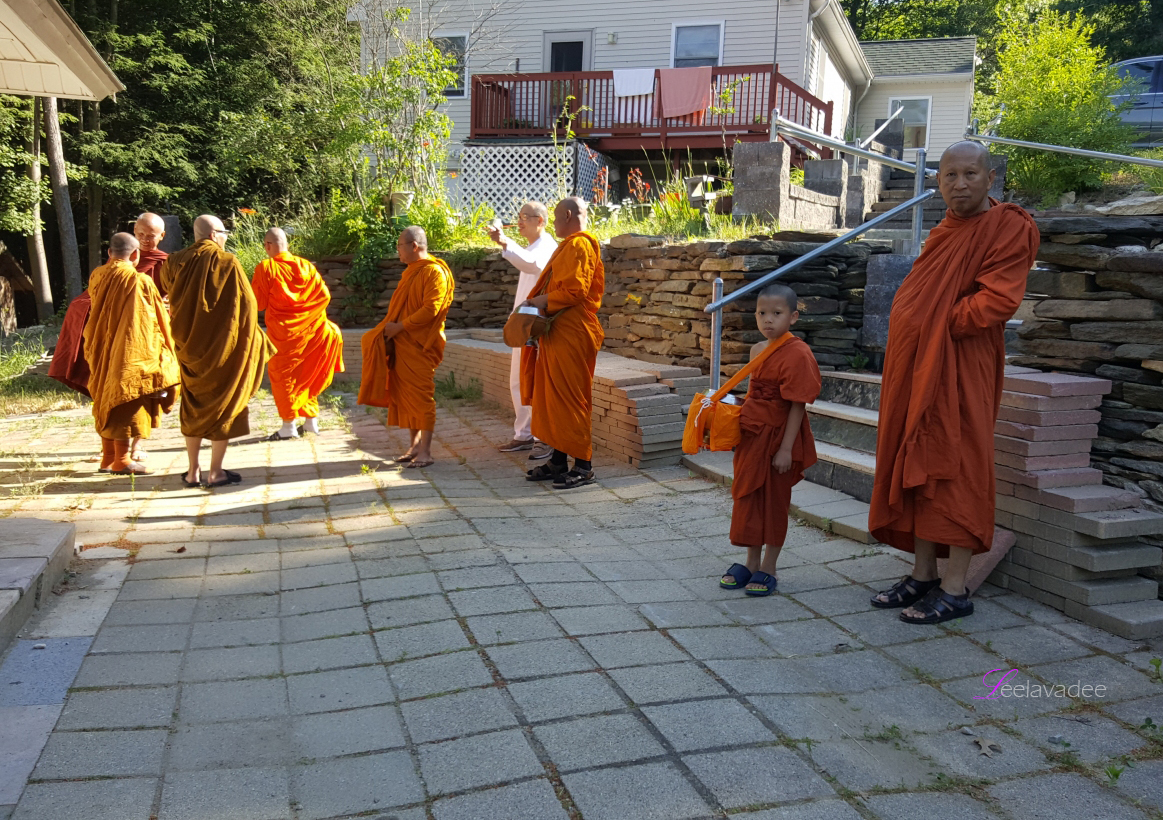-
Comment July 9, 2016
-
Happiness — the generosity one shows
Comment July 9, 2016 -
Mahapajapati Gotami begging permission
Comment July 9, 201630. Mahapajapati Gotami begging permission for women to be admitted into the order as nuns
The Buddha was dwelling at Kapilavatthu in Banyan Park Monastery.Maha-pajapati Gotami approached the Buddha along with five hundred women of the Sakya clan, and begged permission for women to be admitted into the Order as Nuns. The Buddha refused permission saying, ‘Enough, O Gotami, do not ask that women be admitted into the Order as Nuns”. She went away sorrowful and sad.
Later, when the Blessed One was dwelling at Vesali, Mahapajapati Gotami had her hair cut off, put on yellow garments and with five hundred of Sakya women followed to Vaseli. She dared not enter the monastery grounds and stood outside the porch. Now the Venerable Ananda saw her standing there, and went to the Buddha and asked several times for permission to admit women into the Order as Nuns. At last, the Blessed One gave the permission and women were admitted to the Order. Thus an Order of Nunswas founded.
THE ILLUSTRATED HISTORY OF BUDDHISM
by ASHIN JANAKA BHIVAMSA (Aggamahapandita)
Artist: U Ba Kyi | Link to this post -
One who can show us the right path
Comment July 9, 2016 -
When filled with suspicion…
Comment July 9, 2016 -
Venerable Ananda reciting Ratana Sutta Paritta
Comment July 8, 2016
Venerable Ananda reciting Ratana Sutta Paritta to relieve the people of Vesali from attacks of famine and pestilence
29. Venerable Ananda reciting Ratana Sutta Paritta to relieve the people of Vesali from attacks of famine and pestilence
There was scarcity of rain at Vesali (modern Besrah) and many people died from the effects of famine which attacked it. The offensive smell from the corpses brought demons and ogres into the town and there were more deaths. To make matters worse, a disease very much like modern plague broke out, and there were still more deaths. The people discussed ways and means of relief from attacks of famine and disease. They eventually agreed to invite the Buddha for that purpose. and requested the Blessed One to come over from Rajagaha together with his retinue of monks. When the Blessed One arrived at Vesali in the royal barge there was a heavy downpour of rain which washed away all the corpses and the town had become clean. On arrival at the city gate the Venerable Ananda learnt the Ratana Sutta Paritta and recited it by walking round the city in between its three walls, and sprinkling the holy water from his bowl now and again while going round the city with the Licchavi Princes accompanying him. Thus, all the evil spirits were driven away from the city which was rendered free from diseases.
THE ILLUSTRATED HISTORY OF BUDDHISM
by ASHIN JANAKA BHIVAMSA (Aggamahapandita)
Artist: U Ba Kyi | Link to this post -
-
Treasures of the heart are the most valuable
Comment July 7, 2016 -
When a tree has been transplanted
Comment July 7, 2016When a tree has been transplanted, though fierce winds may blow, it will not topple if it has a firm stake to hold it up. But even a tree that has grown up in place may fall over if its roots are weak. Even a feeble person will not stumble if those supporting him are strong, but a person of considerable strength, when alone, may fall down on an uneven path. ~The Writings of Nichiren Daishonin
-
The Buddha welcoming the person who had retired from the world
Comment July 7, 2016
The Buddha welcoming the person who had retired from the world and was to become the Venerable Mahakassapa
28. The Buddha welcoming the person who had retired from the world and was to become the Venerable Mahakassapa
Pippali was destined to become Venerable Mahakassapa who would protect the dispensation of the Dhamma after His death. He was in charge of 14 villages of workmen and a section of the fighting forces. He belonged to a very rich family worth several crores of money and together with his wife retired from home-life to lead a religious life. There was a mighty earth-quake at the place where Pippali parted with his wife on retirement from the world. The Buddha surveyed with His Buddha-eye and saw the cause of the earth-quake.
Immediately thereafter the Buddha went lo the giant banyan tree about 3 gavutas away (about six miles) to welcome Pippali. He then sat at the foot of the tree causing the six resplendent rays of light lo issue forth from His body. Pippali, who later came to be known as Mahakassapa. saw the Blessed One and, coming to this decision: “He indeed is my master”, placed his head upon the feet of the Blessed One and said, “Lord, I am your disciple”. The Buddha often honoured him before the assembly of monks by treating him as a member of the Holy Order of a standing equal to Him.
THE ILLUSTRATED HISTORY OF BUDDHISM
by ASHIN JANAKA BHIVAMSA (Aggamahapandita)
Artist: U Ba Kyi | Link to this post
















